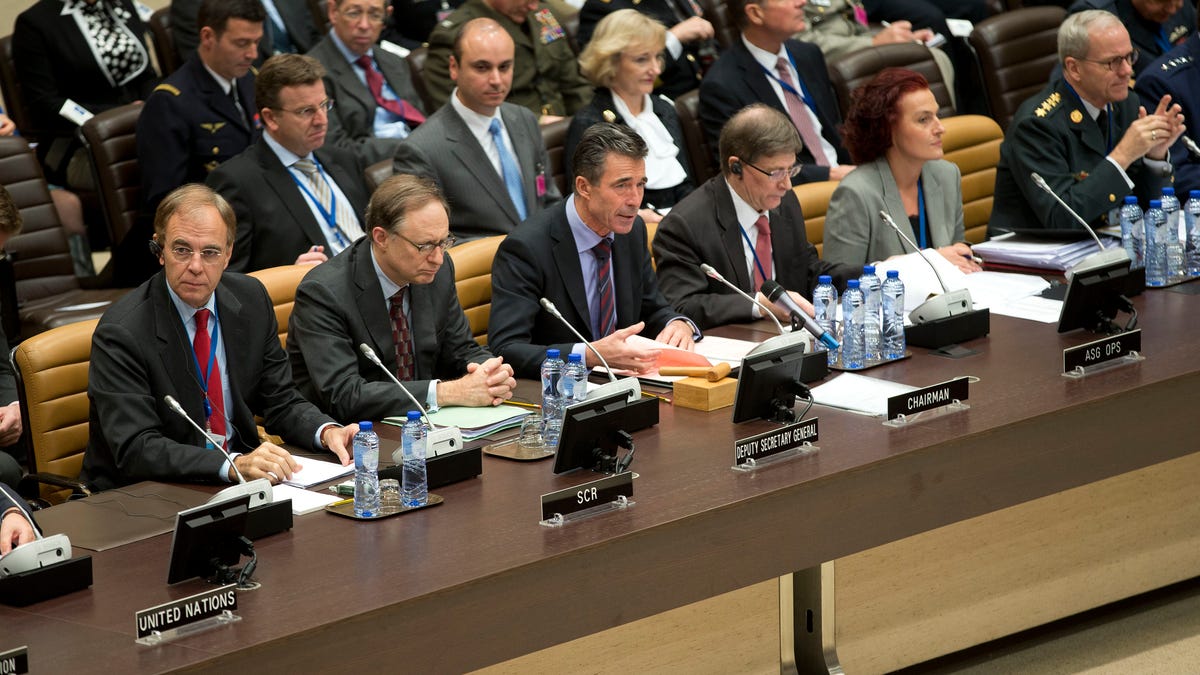
NATO Secretary General Anders Fogh Rasmussen, center, gives opening remarks at the start of the Internal Security Assistance Force (ISAF) meeting at NATO headquarters in Brussels, Wednesday, Dec. 4, 2013. (AP Photo/Pablo Martinez Monsivais, Pool) (The Associated Press)
BRUSSELS – NATO's chief said Wednesday that President Hamid Karzai isn't the only Afghan government official who can sign a security pact so that thousands of coalition troops can stay in Afghanistan after 2014. But an Afghan diplomat insisted Karzai will have final say anyway.
Karzai has balked at signing the bilateral security agreement with the United States. The deal would allow NATO to follow suit for plans for a far smaller assistance mission set to replace its longtime combat role after the end of next year.
The nearly 12-year mission in Afghanistan following the U.S.-led war that toppled the Taliban regime is the biggest ever for the alliance.
Karzai's refusal loomed large at a two-day meeting of alliance foreign ministers that ended Wednesday. NATO chiefs say they need time to plan for the new mission, and need clear rules before then -- in part to help unlock more than $8 billion in annual international military and development aid planned for Afghanistan after 2014.
In a sign that alliance leaders might be looking for a way to circumvent Karzai, NATO Secretary-General Anders Fogh Rasmussen told reporters after a meeting with two top Afghan envoys at NATO's Brussels headquarters that "everyone who is authorized to represent respective governments would be able to sign such an agreement." He did not elaborate.
A day earlier, U.S. Secretary of State John Kerry suggested that Karzai's "minister of defense can sign it, the government can sign it. Somebody can accept responsibility for this."
U.S. officials tempered that comment Wednesday, saying that the defense minister could sign the bilateral agreement -- but only if Karzai delegated such authority. The officials, who spoke on condition of anonymity because they were not authorized to brief reporters by name, added that this was not a diplomatic avenue the United States was now pursuing or encouraging.
Karzai's refusal comes despite strong support from a key Afghan national assembly. He is deferring a decision to his successor after elections in April.
Janan Mosazai, a spokesman for the Afghan Foreign Ministry, told reporters that his government supported the agreement and would sign it "in good time." But it also wanted two assurances -- that a "meaningful" peace process that includes the Taliban must begin in Afghanistan, and U.S. and NATO forces must stop military operations against Afghan homes "because that's not where the terrorists are."
In any case, "it's up to the president of Afghanistan to determine whether the bilateral security agreement will be signed at the presidential level or at a different level between the two governments," Mosazai said.
Under Afghan law, any agreement must be signed twice -- once to get it to parliament and, if approved, then by Karzai alone in his capacity as president.
At a news conference in Washington, the top U.S. military officer, Gen. Martin Dempsey, said the White House has not instructed him to plan for a so-called "zero option" - leaving no U.S. troops in Afghanistan to train and advise Afghan forces after 2014.
"But clearly I understand that it is a possibility given the current impasse," he said.
The current plan is for U.S. troop levels to drop to 34,000 by February, and Dempsey said further withdrawals would not be interrupted by the lack of a bilateral security agreement until "early summer." But he said any delays in signing the deal erode the confidence of Afghan army and police forces.
Russian Foreign Minister Sergey Lavrov said any new NATO mission must adhere to a U.N. Security Council resolution. Russia is a veto-wielding permanent member of the council.
